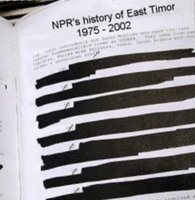 ATC's piece by John Hendren on East Timor is missing a few bits of information. In a pattern all too common on NPR "news," any history that might expose the underside of US foreign policy is simply omitted - even when the information is central to the story. Hendren accompanies Adm. William Fallon, head of the U.S. Pacific Command, on a visit to East Timor. Hendren and the admiral come away with the conclusion that those East Timorese just can't get it together to lead and their country is "a failed state." Not a surprising conclusion given that NPR's "history" of East Timor starts in 2002! Imagine reporting on history of the political situation in Rwanda, Kosovo, or Chechnya by only covering events since 2002.
ATC's piece by John Hendren on East Timor is missing a few bits of information. In a pattern all too common on NPR "news," any history that might expose the underside of US foreign policy is simply omitted - even when the information is central to the story. Hendren accompanies Adm. William Fallon, head of the U.S. Pacific Command, on a visit to East Timor. Hendren and the admiral come away with the conclusion that those East Timorese just can't get it together to lead and their country is "a failed state." Not a surprising conclusion given that NPR's "history" of East Timor starts in 2002! Imagine reporting on history of the political situation in Rwanda, Kosovo, or Chechnya by only covering events since 2002.Even the CIA (!) has to acknowledge the power of history in shaping the current tragedy of East Timor. Their World Factbook, describing Indonesia's ravages in East Timor after 1975, says "an unsuccessful campaign of pacification followed over the next two decades, during which an estimated 100,000 to 250,000 individuals lost their lives." And then on the rampage that Indonesia launched when East Timor voted for indepence in 1999, the CIA writes "anti-independence Timorese militias - organized and supported by the Indonesian military - commenced a large-scale, scorched-earth campaign of retribution. The militias killed approximately 1,400 Timorese and forcibly pushed 300,000 people into West Timor as refugees."
And guess who helped the Indonesians invade East Timor back in 1975, keep them armed and supplied while they tried to "pacify" those 100,000 - 250,000 people? The United States of course (and other European governments). By covering up this history, NPR is aiding those who committed the slaughter of East Timor and helping the Bush administration as it continues to try and rearm Indonesian military with no strings attached.
Addendum: a reader, apparently from the East Timor and Indonesian Action Network (ETAN), suggested the following informative links:


2 comments:
Even the CIA doesn't get it quite right. The violence in 1999 was more from Indonesian's military, than the militia, who were bit players by the end. Official reports documenting direct involvement by the Indonesian military in the violence and destruction have long been available.
As to today, the NPR report gives no indication that the reporter or the admiral talked to any Timorese. Most international observers don't call Timor a "failed state." The country is very troubled and has been mismanaged (and the UN and World Bank bear some responsibility here), but the violence has largely been confined to the capital and most state institutions still function. Most of its leaders are working to come up with solutions, even if they can't all agree on the diagnosis. The brief NPR report is a classic example of parachute journalism at its worst.
For some more knowledgeable and thoughtful analyses of Timor's crisis folks could start with Commission of Inquiry Report Can
Help Timor-Leste Overcome Divisions, But Context of Recent Violence Needs
Attention and other items on the ETAN and La'o Hamutuk
(Institute for Reconstruction Monitoring & Analysis)
Thanks for the links. I'll add them as a postscript to the original post!
Post a Comment